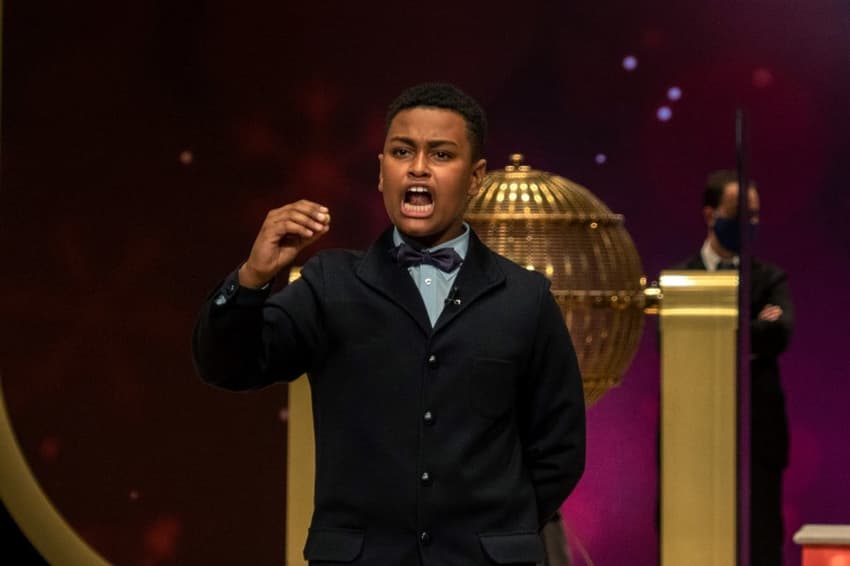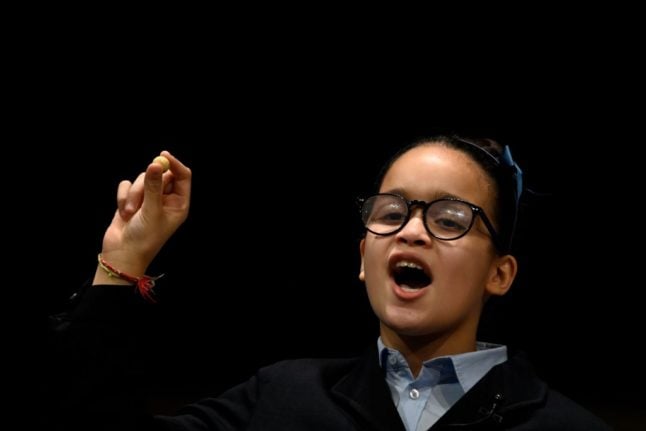Why do children sing Spain's Christmas lottery numbers?

You may have noticed that children are tasked with singing the longwinded Christmas lottery numbers on live TV in Spain. How did this tradition come about?
One of the most important parts of a traditional Spanish Christmas is the Christmas lottery, or El Gordo (the Fat One).
Millions take part in this annual lottery from groups of work colleagues to families and friends, all of whom purchase a fraction of a ticket and get a share of the winnings, if they're lucky enough.
READ ALSO - El Gordo: Everything you need to know about Spain’s Christmas lottery
El Gordo takes place every year in the morning of December 22nd, a few days before Christmas.
One of the most unique aspects of it is that when the balls are drawn, the numbers are sung by children, or more specifically by the pupils of Madrid's San Ildefonso school.
Two huge circular golden cages are set up on stage full of balls emblazoned with numbers, which can match those found on people's lottery tickets and will dictate how much is won.
"19,273" one child will sing, while the other will chant out how much they've won - such as "€20,000!” - when a ball from each of the big golden cages is drawn.
They will continue singing all numbers until the big €4-million ball is drawn or El Gordo itself.
When that happens, it will go something like this in Spanish:
¡Cinco mil cuatrocientos noveeeeenta!
¡Cuatro millooooooones de eeeeeeeurooooooos!
They always use the same tone and rhyme, lengthening the last syllables and words like mil (thousand) and euros. You can listen to an example of it in the video below.
https://www.youtube.com/watch?v=FYfPUbfV99A
Why do children sing the numbers?
The tradition dates all the way back to 1771 during the reign of King Carlos III when a boy from San Ildefonso named Diego López won the lottery. The first official Christmas lottery draw was in 1812 and since then every year, students from López’s school were chosen to sing the numbers.
The only year when they couldn’t sing was in 1936 because of the outbreak of civil war in Spain.
The San Ildefonso school was originally a home for orphans and the tradition of the winners of El Gordo donating a portion of their winnings to San Ildefonso dates back to this time.
San Ildefonso was a boys-only school up until 1981, so it was only boys who would sing the numbers. It wasn't until 1984 that the first girl took part in the big draw singalong.
Thirty-two students are selected each year to volunteer to sing and it is seen as both an honour and a great responsibility.
At the end of the 90s, the school was divided into two – a day school and a boarding school. Around 60 students lived in the boarding school, which was funded by the local government, together with their families who needed economic support.
It is these children who are the ones who are chosen to sing.
It isn't clear why the tradition of singing rather than reading out the numbers came about, but it certainly makes a rather monotonous task a bit more entertaining and enjoyable for both the children and the audience.

A schoolgirl calls out the winning number of the biggest prize of Spain's Christmas lottery "El Gordo" (the Fat One) in 2019. (Photo by OSCAR DEL POZO / AFP)
How are the lottery kids selected?
The children need to meet various criteria to be selected. They must be over eight years old, they must have a good voice and be willing to go to rehearsals.
The singing rehearsals begin around two months beforehand in October and singing numbers are practiced until they're perfect.
Audience members as well as those watching at home get very excited for the big event and the singing is often replicated in parodies on TV or by comedians.
Comments
See Also
One of the most important parts of a traditional Spanish Christmas is the Christmas lottery, or El Gordo (the Fat One).
Millions take part in this annual lottery from groups of work colleagues to families and friends, all of whom purchase a fraction of a ticket and get a share of the winnings, if they're lucky enough.
READ ALSO - El Gordo: Everything you need to know about Spain’s Christmas lottery
El Gordo takes place every year in the morning of December 22nd, a few days before Christmas.
One of the most unique aspects of it is that when the balls are drawn, the numbers are sung by children, or more specifically by the pupils of Madrid's San Ildefonso school.
Two huge circular golden cages are set up on stage full of balls emblazoned with numbers, which can match those found on people's lottery tickets and will dictate how much is won.
"19,273" one child will sing, while the other will chant out how much they've won - such as "€20,000!” - when a ball from each of the big golden cages is drawn.
They will continue singing all numbers until the big €4-million ball is drawn or El Gordo itself.
When that happens, it will go something like this in Spanish:
¡Cinco mil cuatrocientos noveeeeenta!
¡Cuatro millooooooones de eeeeeeeurooooooos!
They always use the same tone and rhyme, lengthening the last syllables and words like mil (thousand) and euros. You can listen to an example of it in the video below.
https://www.youtube.com/watch?v=FYfPUbfV99A
Why do children sing the numbers?
The tradition dates all the way back to 1771 during the reign of King Carlos III when a boy from San Ildefonso named Diego López won the lottery. The first official Christmas lottery draw was in 1812 and since then every year, students from López’s school were chosen to sing the numbers.
The only year when they couldn’t sing was in 1936 because of the outbreak of civil war in Spain.
The San Ildefonso school was originally a home for orphans and the tradition of the winners of El Gordo donating a portion of their winnings to San Ildefonso dates back to this time.
San Ildefonso was a boys-only school up until 1981, so it was only boys who would sing the numbers. It wasn't until 1984 that the first girl took part in the big draw singalong.
Thirty-two students are selected each year to volunteer to sing and it is seen as both an honour and a great responsibility.
At the end of the 90s, the school was divided into two – a day school and a boarding school. Around 60 students lived in the boarding school, which was funded by the local government, together with their families who needed economic support.
It is these children who are the ones who are chosen to sing.
It isn't clear why the tradition of singing rather than reading out the numbers came about, but it certainly makes a rather monotonous task a bit more entertaining and enjoyable for both the children and the audience.

How are the lottery kids selected?
The children need to meet various criteria to be selected. They must be over eight years old, they must have a good voice and be willing to go to rehearsals.
The singing rehearsals begin around two months beforehand in October and singing numbers are practiced until they're perfect.
Audience members as well as those watching at home get very excited for the big event and the singing is often replicated in parodies on TV or by comedians.
Join the conversation in our comments section below. Share your own views and experience and if you have a question or suggestion for our journalists then email us at [email protected].
Please keep comments civil, constructive and on topic – and make sure to read our terms of use before getting involved.
Please log in here to leave a comment.